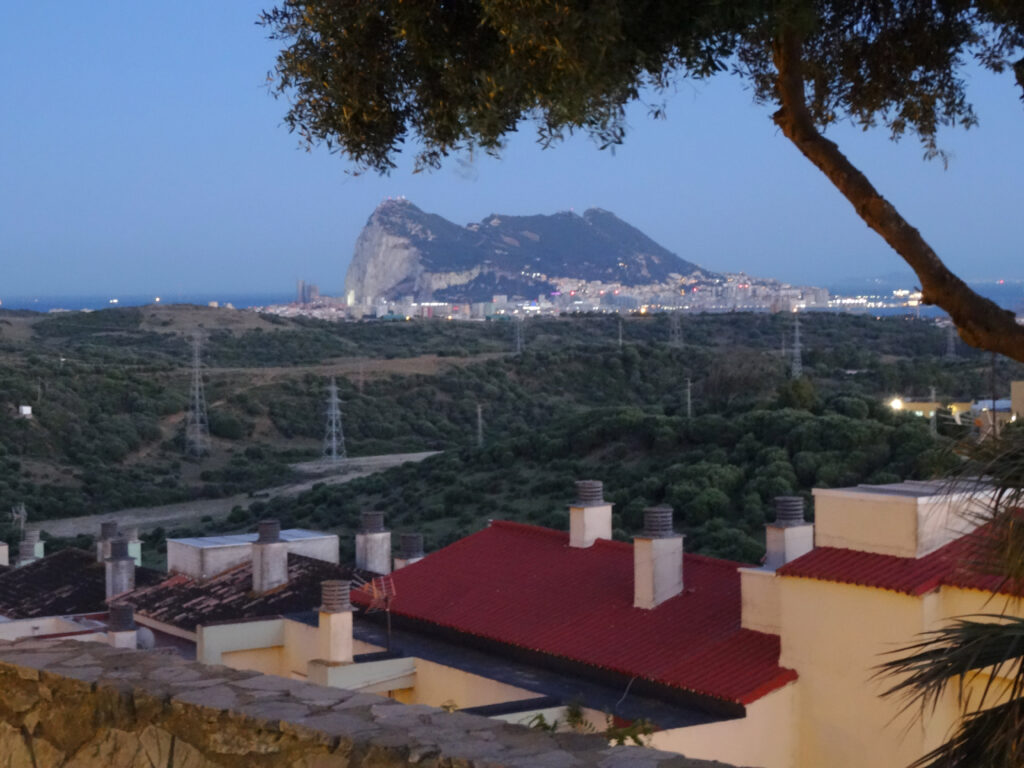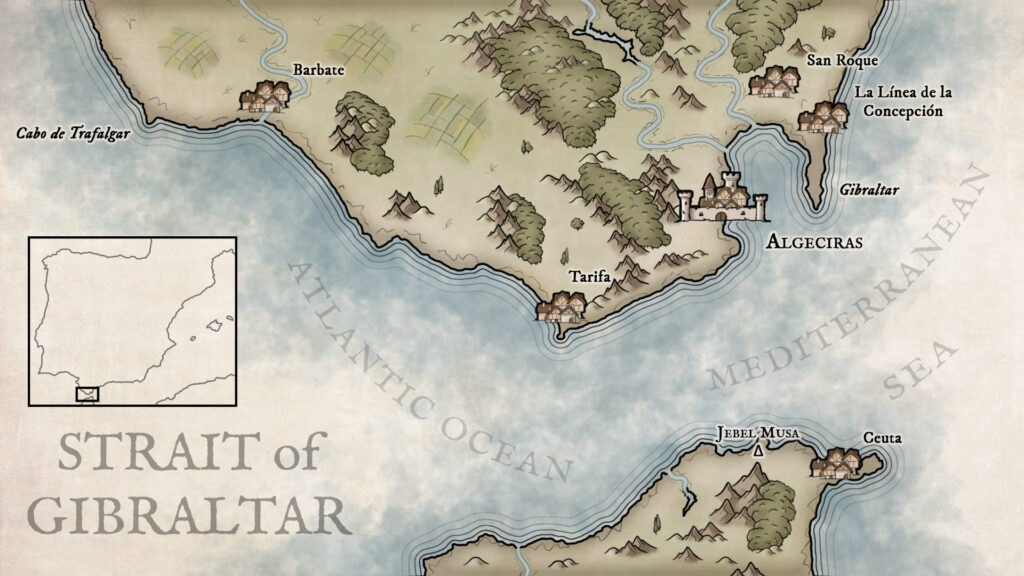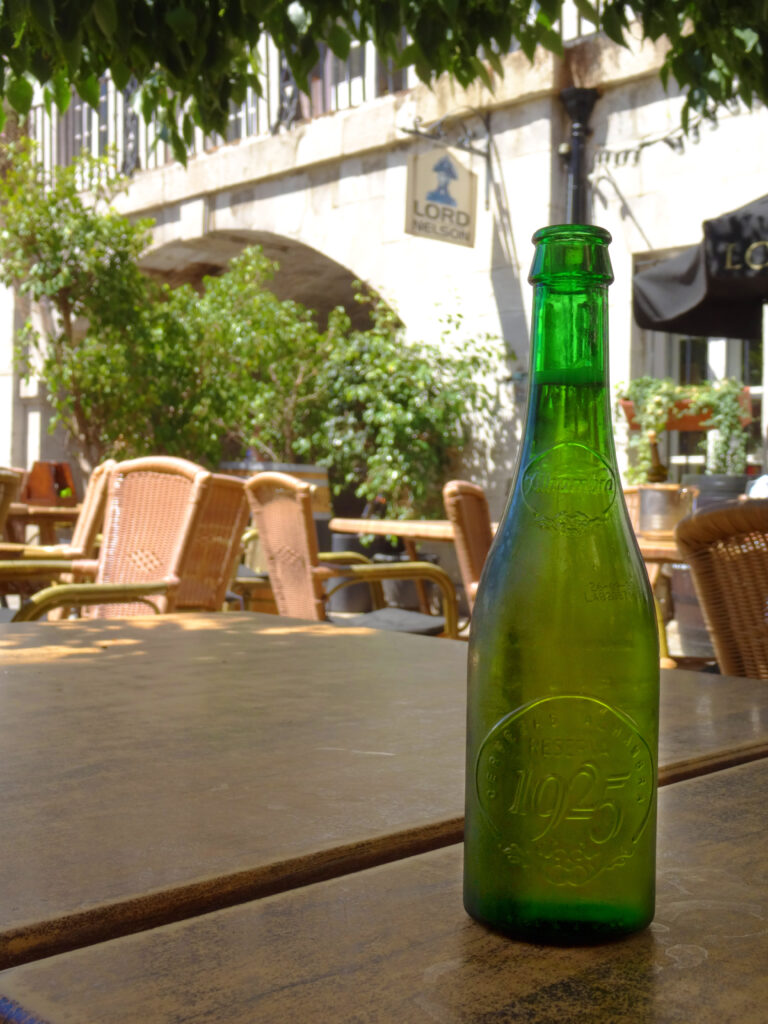
Gibraltar is a small town in the interior of Spain, part of the region of Andalucia. In the cozy square by the church there are a couple of excellent restaurants where the locals gather of an evening. The waiting staff may not speak much English, but if you manage to make yourself understood, you can have delicious tapas for only a few euros.
None of this is true, of course, but neither is it entirely untrue. The municipality of San Roque in the province of Cádiz, is about ten kilometres to the north of the British territory. It has as its motto “Where the spirit of Gibraltar lives on”, for it was here the Spanish citizens of the peninsula were deported when England took over in 1704. Gibraltar proper, on the other hand, is more British than Britain itself. Tourists arrive from the motherland by planeloads. If you enter from mainland Spain, however, your best option is to park your car in adjoining La Línea de la Concepción and exit the EU on foot. Since the runway intersects the narrow isthmus leading to the peninsula at a right angle, you might have to wait a few minutes for a plane to land before walking across. Once on British soil, you can enjoy the curious experience of eating a full English breakfast in a pub while looking out over the Mediterranean, surrounded by British accents on every side.
Gibraltar was inhabited before we even arrived. The porous face of the Rock offered hospitable caves for the Neanderthals, who lived there at least as early as 127,000 years ago. Neanderthal remains were in fact found here before in the Neander Valley, but were not at the time classified as belonging to a separate human species. Had it been, we would today have been speaking of Homo gibraltarensis instead of Homo neanderthalensis.
After being colonised by Phoenicians, Romans and Visigoths, the Muslims arrived in 711 AD. They named the Rock Jabal Ṭāriq, “the Mount of Ṭāriq”, after their commanding officer, which was rendered in Spanish as Gibraltar. The Reconquista reached the peninsula in 1462, when it became part of Castile, later Spain. In 1701, the War of the Spanish Succession broke out as other European kingdoms resisted Louis XIV’s ambitions to extend his dominion into the Iberian Peninsula. England, who had long desired a foothold in the Mediterranean, saw an opportunity to seize Gibraltar, which with Dutch help they did in 1704. The possession was formalised by the Treaty of Utrecht in 1713, whereby Gibraltar was ceded to Great Britain “in perpetuity”. Primarily a base for the Royal Navy, the place acquired ill repute, and visitors were shocked by the moral and physical squalor they encountered. It is no coincident that Molly, Leopold Bloom’s promiscuous wife in James Joyce’s Ulysses, was originally from Gibraltar. Only in recent years, as trade and tourism became more important than military affairs, did Gibraltar clean up and become respectable.

In international law there are two principles guiding the formation, re-formation and preservation of nations: one is territorial integrity, the other is self-determination. The former is often associated with the peace of Westphalia following the Thirty Years’ War, and simply says that no state has the right to interfere in the internal affairs of another. The principle of self-determination is of a newer date and was most clearly defined by Woodrow Wilson at the end of World War I: “National aspirations must be respected; people may now be dominated and governed only by their own consent.” In theory, these principles in combination would help bring Europe from the chaotic, early-modern mishmash of vast empires and miniature principalities, to the orderly modern-day jig-saw puzzle of disparate nation states, each distinguished by its own ethnicity, language, history and culture. In reality the matter was never quite so simple, as the example of Gibraltar shows.
To begin with the issue of self-determination – the question of Gibraltarians’ “own consent” – this is a non-starter. In a 1967 referendum, the option of passing under Spanish sovereignty received a grand total of 44 votes, or 0.36%. A 2002 referendum on shared sovereignty fared little better, with 1.03% in favour. Any chance of the peninsula’s citizens warming to Spanish rule were effectively ruined by General Franco’s decision to close the border between the British Territory and the mainland. The dictator’s petty action soured Gibraltarians on Spanish unification indefinitely.[1]
An appeal to territorial integrity seems more promising on the face of it. Looking at a map of the Iberian Peninsula (ignoring the historical anomaly that is Portugal), Spain seems like the best candidate for territorial integrity one could imagine, barring island nations. Bordered on three and a half sides by oceans, its remaining land border is the straight line of the Pyrenean mountain range. It is hard to imagine a more clearly defined territory than that. And yet, this is not what territorial integrity means. The principle relates to a nation’s territory as it exists, not as it ideally should exist. As former Chief Minister of Gibraltar Joseph Bossano put it: “The territorial integrity is that of a country that joins the UN as it is when it joins not as it was 300 years earlier.”[2] Any historical justification will also founder, since Gibraltar has by now belonged to Britain for longer (1704-present) than it ever belonged to Spain (1462-1704).
Spain has tried to apply the fashionable rhetoric of decolonisation, and Britain, as she has shown for more than half a century, is not averse to this line of reasoning. The problem is that decolonisation from the UK normally means independence, but this is not possible in the case of Gibraltar. The Treaty of Utrecht is clear that, should British sovereignty cease, Gibraltar cannot be independent, but will revert to Spain, and this is not an option. Spanish talk of decolonisation also smacks of hypocrisy, since right across the strait, by that other Pillar of Hercules, lies Ceuta. Along with Melilla to the east, this exclave is claimed by the Moroccan government, but Spain refuses to give it up.
All in all, Spain does not really have a good case, but the whole situation demonstrates how principles of international relations often collide with each other, and with reality. The principle of territorial integrity, or respect for a state’s sovereignty within its own territory, provides a basis for the international community to react when that sovereignty is violated by another state. But does this absolve that international community from reacting when human rights are violated within the territory? Is the rest of the world obliged to remain passive as crimes against humanity are committed, up to and including genocide?
In 1822, the Ottoman Empire attacked the island of Chios in an effort to suppress the incipient Greek independence movement. Out of a population of 120,000, only some 20,000 were left after the incursion; the rest were killed, enslaved or driven into exile. Once news of the Chios massacre reached the rest of Europe, it caused outrage and a call for action. The great powers had so far not been particularly invested in the conflict, but after Chios and other atrocities, Britain, France and Russia intervened and defeated the Ottoman navy at the Battle of Navarino in 1827. The intervention helped secure Greece’s eventual independence. This battle is often considered the first example of humanitarian intervention – a case wherein considerations of human rights violations override considerations of territorial integrity – and yet, the three allied nations each had their own, strategic reasons for intervening.[3] Since then, humanitarian intervention has been a force for good, but also often been used as a pretence for cynical promotion of national self-interest.
As for self-determination, this is an even more complex principle to put into practice. The main problem is that, for all the efforts of lawyers, politicians and activists to define it, there is no agreement on exactly what the term means. Who exactly has the right to self-determination – regions, nations, ethnic groups? Does it justify secession, or will limited devolution of power satisfy the demand? And even if a state grants independence to a subdivision, where will the new borders be drawn, if the dividing lines run through cities, neighbourhoods, families?
The European state most affected by Wilson’s drive for self-determination was the Austro-Hungarian Empire. Number ten of the American president’s Fourteen Points stipulates that “The peoples of Austria-Hungary, whose place among the nations we wish to see safeguarded and assured, should be accorded the freest opportunity to autonomous development.” Ever since 1683, when the Turks were driven back from the siege of Vienna, the Habsburgs had extended their dominion over great parts of Eastern Europe, often by the sword. Nationalists in dependent territories resented imperial rule, of course, but the independence they sought would come at a price. Under the Austro-Hungarian Constitution of 1867, subjects had freedom of movement and ethnic minorities were secure under the imperial aegis. It was in the Habsburgs’ interest to protect and support their human capital in this way, while striving to reduce civil unrest to a minimum. Once the empire was dismantled, this Pax Austriaca was disrupted, and in its wake followed forced displacement, ethnic cleansing and general disorder, the remnants of which can be seen till this day.
Behind all the talk of principles of international relations hides the reality of lived human experience, such as the fate of the Spanish citizens of Gibraltar. The English gave them the option of remaining in the occupied territory, but after seeing the invaders’ behaviour – mistreating the locals, desecrating churches – most decided to leave; of about 4000 inhabitants, only 70 stayed behind.[4] On 7 August 1704, families loaded their possessions onto carts and left. Driven out of their littoral Eden, they headed for an unknown village in the hills above.
Home is where one starts from, wrote Eliot, but for most of human history it was also where one ended. To us, for whom deracination is the norm, it is easy to forget how painful exile could be in traditional society, where your birthplace was a part of your permanent identity. How much more painful would it not have been to those who could see their former home every day, tauntingly shimmering in the distance? As the sun sets over San Roque, the cliffs of Gibraltar melt from view, like a fading family photo.
In the local museum can be found a small clay tablet, left by the side of the road by town councillor Bartolome Luis Varela as he walked along that one-way street with his fellow citizens. It reads: “AQUI LORE A GIBRATAR 8 704 VIREL”. Here I cried for Gibraltar.
Alhambra

Life at sea could be hard in the early 1800s; when Admiral Nelson arrived in Gibraltar on 20 July 1805: “I went on shore for the first time since the June 16, 1803; and from having my foot out of the Victory, two years wanting ten days.”[1] He would have spent time here at the Grand Casemates, where there is now a pub bearing his name. The whole of Grand Casemates Square is today a tourist destination, but back then it served as fortification and barracks. Nelson’s greatest victory took place a few months later right on the other side of the strait, at the Battle of Trafalgar, where he also met his death.
To circle back to the Arab and Moorish invaders of 711, they eventually made their capital the city of Grenada, where they erected the architectural wonder that is the Alhambra. These Muslim rulers were relatively tolerant of the production and consumption of beer, so it is not entirely far-fetched for a brand to carry the name of this famous building. Cervezas Alhambra was founded in 1925, and its flagship beer is the pilsner Alhambra Reserva 1925, introduced in 1998. It is mild and refreshing, with a hint of honey to it.
[1] James Stanier Clarke and John McArthur, The Life of Admiral Lord Nelson, K.B. From His Lordship’s Manuscripts, vol. 2 (London: T. Cadell & W. Davies, 1809), 416.
[1] Peter Gold, A Stone in Spain’s Shoe: The Search for a Solution to the Problem of Gibraltar (Liverpool: Liverpool University Press, 1994), 2.
[2] Joseph Bossano, ‘Third International Decade for the Eradication of Colonialism: Statement by Joseph Bossano’ (United Nations, 2 to 4 May 2019), 3.
[3] Davide Rodogno, Against Massacre: Humanitarian Interventions in the Ottoman Empire, 1815-1914 (Princeton, NJ [u.a.]: Princeton Univ. Press, 2012), 88.
[4] George Hills, Rock of Contention: A History of Gibraltar (London: Hale, 1974), 176.